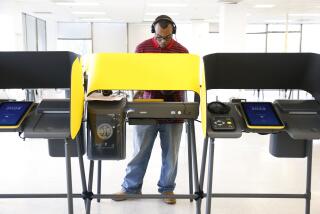Don’t look to a third-party candidate
Santa Claus, the Easter Bunny, Barack Obama and an independent and pragmatic president beholden to no party, ideology or interest group are walking down the street. At the same time, all four spot a dollar bill on the ground. Who gets the dollar?
Obama, of course. The other three are figments of your imagination.
Or, more to the point, the imaginations of many political journalists, who in every election cycle talk excitedly about the prospects for an independent candidate to run for the presidency. Recently, some columnists have been singing the virtues of a new organization called Americans Elect, which proposes an Internet convention to nominate a centrist, outsider presidential candidate for 2012.
The desire for an independent candidacy is easy enough to understand: Why wouldn’t the solution to our nation’s problems be a moderate president, without ties to the usual suspects, who is free to simply do what is right?
The problem is, it’s not going to happen. What’s more, we really don’t want it to.
It’s not going to happen because the major party candidates have three huge advantages. They are already organized. They have built-in supporters. And our electoral institutions favor the largest two parties.
Let’s say you think you’re the perfect centrist unifier, owing no one but the voters. To win the presidency, you have to campaign across the country. You have to build a campaign in state after state — from scratch. You have to assemble lists of donors and databases of voters to contact, and you have to develop a base of volunteers who can carry out the vital tasks of organizing and campaigning precinct by precinct.
Yes, the Internet can help, but how much? Bear in mind, even Amazon.com does not yet have a majority of the market share for books, and it has been at it for years. Meanwhile, the Democrats and Republicans are also using the Internet. Obama made expert use of the new media, yet his nomination was a struggle. And no one thinks he won the nomination without on-the-ground volunteers.
The Democrats and Republicans also have it easier because they have some states sewn up. Democrats can count on the electoral votes from California. Republicans can count on Texas. They can do that because voters have long-standing attachments to the parties. An independent candidate for 2012 would have to build those connections in less than a year.
Keep in mind that about 40% of the country votes Republican and about 40% votes Democratic in a presidential election no matter who the candidates are. Even if you could win over some of the less committed voters in the middle, it would be very hard to pull away those committed partisans. At best, an independent candidate could win 20% to 30% of the vote. (Teddy Roosevelt, the best-performing third-party presidential candidate of the past century, won just over 27% of the vote in 1912, and he was a former president.)
Because nearly all states use a winner-take-all system for their electoral college votes, that might not be enough to win even one state. That’s what happened to Ross Perot in 1992; he won 19% of the popular vote — the highest for a third-party presidential candidate since Teddy Roosevelt — but not a single electoral college vote.
There’s a theory in political science that explains this challenge. Duverger’s Law, named after Maurice Duverger, the French scholar who most explicitly articulated it, boils down to the idea that voters are strategic. In a winner-take-all election, they know there’s virtually no chance of the third-most-popular candidate winning. Better to help determine which of the top two candidates wins. So they vote for the least objectionable of the candidates with a real shot at winning. Candidates are strategic too, so serious independents or third-party candidates rarely enter the race. This is why countries with winner-take-all elections tend to have just two major parties.
The last third-party candidate to win the presidency was Abraham Lincoln, in 1860, 151 years ago. But Lincoln’s campaign was hardly independent. The Republican Party had been organizing for years, and it had representation in Congress. And one of the previous major parties, the Whigs, was collapsing, its followers mostly switching to the Republicans.
Let’s say an independent were to be elected president; he would be a disaster. The president is not a dictator. If he wants to cut or raise taxes, rein in or expand entitlements, enhance or remove environmental regulations, or do just about anything else, he has to work with Congress. A president wishing to hire people for his senior staff and seeking to appoint Cabinet members and judges needs congressional approval. A president with no party ties has no automatic allies — each one of these decisions would require a fight with Congress and a cobbled-together coalition to pass the president’s priorities.
Without a party in his corner, the president would be in a constant struggle to perform even the most basic tasks of governing. Imagine if Obama had had no allies in Congress during the debt ceiling battle, instead of a majority of the Senate and a significant, organized minority in the House.
All of this seems unfair. Why should these two parties have such an advantage? That’s the wrong way to look at it. The Democrats and the Republicans are not our overlords. They are us. They are the natural creations of politically concerned citizens who want to make a difference. And because in a democracy, the more people you have, the more chance you have of making a difference, parties organize together to have strength in numbers.
That is democracy: people joining together, compromising among themselves to arrive at policies, and trying to get those policies enacted.
If you’re not content with the way this country is being governed, one of the best ways to change it is to get involved with one of the existing parties and work to nominate and elect candidates at all levels of government who will fight for the things you care about. Odds are, one of the parties will want much of what you want. Pining for an independent, third-party dictator is not only a waste of your time, but if you somehow got what you wanted, you’d quickly find it wasn’t what you wanted at all.
Seth Masket is an associate professor of political science at the University of Denver and the author of “No Middle Ground: How Informal Party Organizations Control Nominations and Polarize Legislatures.” Hans Noel is an assistant professor at Georgetown University and an author of “The Party Decides: Presidential Nominations Before and After Reform.”
More to Read
A cure for the common opinion
Get thought-provoking perspectives with our weekly newsletter.
You may occasionally receive promotional content from the Los Angeles Times.






